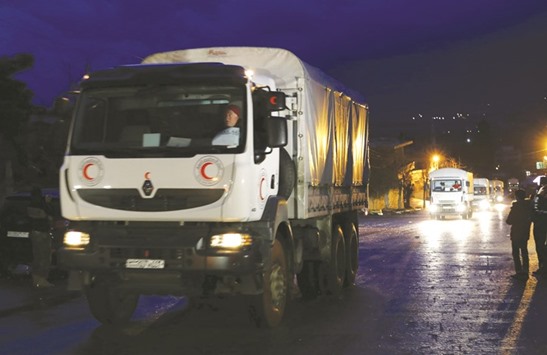Aid supplies reached a besieged Syrian town and two trapped villages yesterday for the second time this week, raising hopes of further deliveries to help people dying of starvation.
The Britain-based Syrian Observatory for Human Rights, which monitors the war, said aid trucks had started entering the town of Madaya near the border with Lebanon, and the villages of Kefraya and al-Foua in Idlib province in the northwest. Syrian state media said six trucks had entered Madaya.
For months, tens of thousands have been blockaded by government troops in Madaya and surrounded by rebel forces in the two villages.
“According to the ICRC team that entered Madaya, the people were very happy, even crying when they realised that wheat flour is on the way,” Dominik Stillhart, International Committee of the Red Cross director of operations, said in New York.
Aid officials hoped to bring in more supplies, with fuel deliveries set for Sunday, according to Stillhart.
“We hope ... this effort will continue,” said Yacoub El Hillo, the UN resident and humanitarian coordinator in Syria, who accompanied the convoy.
A senior UN human rights official said the use of starvation was a war crime whose perpetrators should be prosecuted.
“Starving civilians is a war crime under international humanitarian law and of course any such act deserves to be condemned, whether it’s in Madaya or Idlib,” said UN Human Rights High Commissioner Zeid bin Ra’ad.
“Should there be prosecutions? Of course. At the very least there should be accountability for these crimes.”
The siege of Madaya, where people have reportedly died of starvation, has become a focal issue for Syrian opposition groups who want all such blockades lifted before they enter negotiations with the government planned for January 25.
A prominent member of the political opposition to President Bashar al-Assad told Reuters that date was unrealistic, reiterating opposition demands for the lifting of sieges, a ceasefire and the release of detainees before negotiations.
“I personally do not think Jan. 25 is a realistic date for when it will be possible to remove all obstacles facing the negotiations,” George Sabra told Reuters.
A total of 45 trucks carrying food and medical supplies are due to be delivered to Madaya, and 18 to al-Foua and Kefraya, aid officials said.
The Syrian Observatory said it had recorded 27 deaths in Madaya from malnutrition and lack of medical supplies, and at least 13 deaths in al-Foua and Kefraya due to lack of medical supplies.
The population of Madaya is estimated at 40,000, while about 20,000 live in al-Foua and Kefraya.
The World Food Programme said it would deliver 120 tonnes of wheat flour to Madaya, and 60 tonnes to al-Foua and Kefraya.
A UN official said the convoy also included medical supplies, blankets, and clothing.
The World Health Organization is awaiting an answer from the government to a request to send medics and mobile clinics, its representative in Damascus said.
“The scenes we witnessed in Madaya were truly heartbreaking,” said Marianne Gasser, the most senior official with the International Committee of the Red Cross in Syria.
“The conditions are some of the worst that I have witnessed in my five years in the country. This cannot go on,” she said.
The talks planned for January 25 in Geneva are part of a peace process endorsed by the UN Security Council last month in a rare display of international agreement on Syria, where the war has killed 250,000 people.
UN Special Envoy for Syria Staffan de Mistura said after meeting representatives of the US, Russia and other powers on Wednesday that January 25 was still the intended date.
But even with the backing of the US and Russia, which support opposite sides in the conflict, the peace process faces formidable obstacles.
“The meeting is due in a bit more than 10 days, but before then de Mistura will present in New York what he has achieved,” said a senior western diplomat.
“But he still has to define how to press ahead with this mechanism which to me is not looking good because all sides are not agreed on the parameters.”
Rebel groups that back the idea of a political settlement issued a statement on Wednesday rejecting any negotiations before goodwill measures from Damascus including a ceasefire.
Sabra, the opposition politician, said: “There are still towns under siege. There are still Russian attacks on villages, schools and hospitals. There is no sign of goodwill.”
There are about 15 siege locations in Syria, where 450,000 people are trapped, the UN says.
The Syrian government has said it is ready to take part in the talks, but wants to see who is on the opposition negotiating team and a list of armed groups that will be classified as terrorists as part of the peace process.
Underscoring the complications on that issue, a senior Russian official condemned as terrorists two rebel groups that are represented in a newly-formed opposition council tasked with overseeing the negotiations.
“We do not see Ahrar Al Sham or Jaysh Al Islam as part of the opposition delegation because they are terrorist organisations. We believe that the opposition delegation should be represented not by terrorist representatives,” the RIA news agency quoted Deputy Foreign Minister Gennady Gatilov as saying in Moscow yesterday.

An aid convoy from the Syrian Arab Red Crescent enters the besieged town of Madaya.
